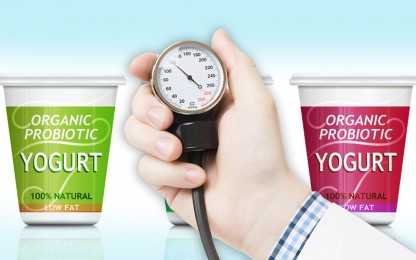Probiotics Are Effective Natural Blood Pressure Remedies
The list of reasons why you should take a probiotic as a dietary supplement continues to grow. Probiotics can even be used to help with blood pressure issues.
 I, like many people, have a bad habit about forgetting to take my dietary supplements on a regular basis. Only recently, when I felt a cold coming on, did I reinstate my daily probiotic regimen. This was a habit I had set aside for far too long, but that I believe to be an essential tool to getting and staying healthy. If you have ever wondered, “why take probiotics?” the answer is long and the reasons are widespread; probiotics are important for everything from fighting off the common cold to preserving memory to treating chronic fatigue. Recent findings suggest that probiotics are also useful as natural blood pressure remedies.
I, like many people, have a bad habit about forgetting to take my dietary supplements on a regular basis. Only recently, when I felt a cold coming on, did I reinstate my daily probiotic regimen. This was a habit I had set aside for far too long, but that I believe to be an essential tool to getting and staying healthy. If you have ever wondered, “why take probiotics?” the answer is long and the reasons are widespread; probiotics are important for everything from fighting off the common cold to preserving memory to treating chronic fatigue. Recent findings suggest that probiotics are also useful as natural blood pressure remedies.
Probiotic consumption and blood pressure
A recent review found that people who consumed probiotics had an average of 3.56 mmHg lower systolic blood pressure and 2.38 mmHg lower diastolic blood pressure compared to control groups who did not take probiotics.[1]
The study, published in the journal Hypertension, found that there was a greater reduction in those people who already had elevated blood pressure. The researchers also concluded that blood pressure was affected more if the intervention was longer than eight weeks, used probiotics from multiple strains, and used a dose of greater than 1011 CFU (colony-forming units) per day.[1]
While reductions in blood pressure of 3.56 mmHg and 2.38 mmHg may seem small, reductions of only 3.3 mmHg for systolic and 1.4 mmHg for diastolic have been associated with a 22% reduction in cardiovascular mortality, heart attack, and stroke.[1]
Why do probiotics benefit blood pressure?
Probiotics likely help reduce blood pressure by a variety of mechanisms. The bacterial community in our bodies is closely tied to cardiovascular health. For example, oral bacteria in the mouth help generate nitric oxide, which plays a large role in lowering blood pressure.[2] Probiotics may also effect the angiotensin-converting enzyme (ACE), which helps to lower blood pressure as well.[1]
Decreasing cardiovascular disease risk
Studies suggest that probiotics are effective tools in helping to prevent cardiovascular disease. This protective effect is partly due to the way probiotics reduce several risk factors for heart disease, not just blood pressure. They also are extremely effective at lowering cholesterol and treating obesity as well.[2]
If you are looking for natural ways to lower blood pressure, probiotics may be an important dietary supplement to add to your daily routine. For information on choosing the best probiotic supplements, read more here. Remember, it seems that multiple strains of bacteria, as opposed to a single strain, are most effective, and you will need to take your probiotic for at least eight weeks to see best results.
Share your experience
Do you take probiotics? What are your answers to the question, “why take probiotics?” What strains of probiotics do you take?


 WHITE COAT SYNDROME
WHITE COAT SYNDROME  News Briefs February 2024
News Briefs February 2024  Savor the Sweet Potato
Savor the Sweet Potato 